Ukraine
¬Ђ–Э–µ —В–Њ¬†—З—В–Њ–±—Л —Д—Г—В–±–Њ–ї—М–љ—Л–є –Ї–ї—Г–± ¬Ђ–Ъ–≤–∞—А—Ж¬ї (–®–µ–ї—Г–і—М–Ї–Њ–≤–Ї–∞) –љ–Є—З–µ–≥–Њ –љ–µ¬†–Є–Љ–µ–µ—В –Њ—В¬†—З–µ–Љ–њ–Є–Њ–љ–∞—В–∞ –Х–≤—А–Њ–њ—Л –њ–Њ¬†—Д—Г—В–±–Њ–ї—Г. –Т–µ–і—М –љ–∞¬†–Њ–±–љ–Њ–≤–ї–µ–љ–љ–Њ–Љ —Б—В–∞–і–Є–Њ–љ–µ —Е–∞—А—М–Ї–Њ–≤—Б–Ї–Њ–≥–Њ ¬Ђ–Ь–µ—В–∞–ї–ї–Є—Б—В–∞¬ї –≤¬†—З–µ—Б—В—М –Ї–Њ–љ—В–Є–љ–µ–љ—В–∞–ї—М–љ–Њ–≥–Њ —В—Г—А–љ–Є—А–∞ –њ–Њ–Љ–µ–љ—П–ї–Є —Б–Є–і–µ–љ—М—П. –Ш¬†¬Ђ–Ъ–≤–∞—А—Ж¬ї —Б–Љ–Њ–≥ –Ј–∞–њ–Њ–ї—Г—З–Є—В—М 150 —Б—В–∞—А—Л—Е –њ–ї–∞—Б—В–Є–Ї–Њ–≤—Л—Е –Ї—А–µ—Б–µ–ї. ¬Ђ–Р¬†—В–∞–Ї –Њ–љ–Є –њ–Њ–њ–∞–ї–Є¬†–±—Л –љ–∞¬†–њ–Њ–Љ–Њ–є–Ї—Г¬ї,¬†вАФ —А–∞—Б—Б–Ї–∞–Ј–∞–ї –Љ–љ–µ –Ю–ї–µ—Б—М –Ы—Л—Б–∞–Ї, –Љ–µ–љ–µ–і–ґ–µ—А –Ї–ї—Г–±–∞вА¶ 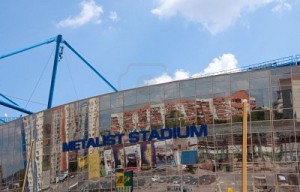
–Ф–µ—А–µ–≤–љ—П –®–µ–ї—Г–і—М–Ї–Њ–≤–Ї–∞, –Ч–Љ–Є—С–≤—Б–Ї–Є–є —А–∞–є–Њ–љ, –•–∞—А—М–Ї–Њ–≤—Б–Ї–∞—П –Њ–±–ї–∞—Б—В—М. –Т–Њ—Б—В–Њ—З–љ–∞—П, —З–µ—А–љ–Њ–Ј–µ–Љ–љ–∞—П –£–Ї—А–∞–Є–љ–∞, –њ–Њ—З—В–Є —Г–ґ–µ –†–Њ—Б—Б–Є—П. –Э–µ–±–Њ–≥–∞—В–∞—ПвА¶
–Э–Њ—А–Љ–∞–ї—М–љ—Л–µ —Д—Г—В–±–Њ–ї—М–љ—Л–µ –Љ–∞–є–Ї–Є, –Љ—П—З–Є –≤¬†–Ч–Љ–Є—С–≤—Б–Ї–Њ–Љ –Є¬†–≤¬†—Б–Њ—Б–µ–і–љ–Є—Е —Б–µ–ї—М—Б–Ї–Є—Е —А–∞–є–Њ–љ–∞—Е¬†вАФ –і–µ—Д–Є—Ж–Є—В. –£¬†–Љ–Њ–ї–Њ–і–µ–ґ–љ—Л—Е –Ї–Њ–Љ–∞–љ–і ¬Ђ–Ъ–≤–∞—А—Ж–∞¬ї –љ–µ¬†—Е–≤–∞—В–∞–µ—В —Б–Њ–њ–µ—А–љ–Є–Ї–Њ–≤, —З—В–Њ–±—Л —А–µ–≥—Г–ї—П—А–љ–Њ –Є–≥—А–∞—В—М –≤¬†–њ–µ—А–≤–µ–љ—Б—В–≤–µ —А–∞–є–Њ–љ–∞. –Я—А–Є—Е–Њ–і–Є—В—Б—П –µ–Ј–і–Є—В—М –љ–∞¬†—В—Г—А–љ–Є—А—Л, –Ї–Њ—В–Њ—А—Л–µ –Њ—А–≥–∞–љ–Є–Ј—Г—О—В –љ–∞¬†—Г—А–Њ–≤–љ–µ –Њ–±–ї–∞—Б—В–Є. –†–µ–±—П—В–∞ –Љ–ї–∞–і—И–µ 14¬†–µ–Ј–і–Є–ї–Є –љ–∞¬†¬Ђ–Ъ–Њ–ґ–∞–љ—Л–є –Љ—П—З¬ї –≤¬†–і—А—Г–≥–Њ–є —А–∞–є—Ж–µ–љ—В—А, –±–Њ–ї—М—И–µ —Б—В–∞ –Ї–Є–ї–Њ–Љ–µ—В—А–Њ–≤ –љ–∞¬†—Б–µ–≤–µ—А. –Ґ—Г–і–∞ –Є–Ј¬†–≤–Њ—Б—М–Љ–Є –Ї–Њ–Љ–∞–љ–і, –Ї–Њ—В–Њ—А—Л–µ –њ–Њ–і–∞–ї–Є –Ј–∞—П–≤–Ї—Г, –і–Њ–µ—Е–∞–ї–Є –њ—П—В—М. –Ґ—А–∞–љ—Б–њ–Њ—А—В–∞ –љ–µ—В, –±–µ–љ–Ј–Є–љ–∞ –љ–µ—ВвА¶
¬Ђ–®–µ–ї—Г–і—М–Ї–Њ–≤–Ї–∞¬†вАФ —Н—В–Њ –Њ—Б—В—А–Њ–≤¬ї,¬†вАФ —Б–Ї–∞–Ј–∞–ї–Є –Љ–љ–µ –≤¬†–•–∞—А—М–Ї–Њ–≤–µ. –Ю—Б—В—А–Њ–≤ —Д—Г—В–±–Њ–ї–∞ –≤¬†–њ–Њ—Б—В—Б–Њ–≤–µ—В—Б–Ї–Њ–є –њ—Г—Б—В—Л–љ–µ —Б–њ–Њ—А—В–Є–≤–љ–Њ–є –љ–Є—Й–µ—В—Л. –Ґ–∞–Ї—Г—О –і–µ—А–µ–≤–µ–љ—Б–Ї—Г—О –≤—Г–љ–і–µ—А–Ї–Њ–Љ–∞–љ–і—Г –Љ–Њ–≥–ї–Є¬†–±—Л –≤—Л–і—Г–Љ–∞—В—М –Є—В–∞–ї—М—П–љ—Ж—Л –і–ї—П —Б–µ–љ—В–Є–Љ–µ–љ—В–∞–ї—М–љ–Њ–є –Ї–Є–љ–Њ–Ї–Њ–Љ–µ–і–Є–Є –Њ¬†—Б–Ї–∞–Ј–Њ—З–љ–Њ–є –і–Њ—А–Њ–≥–µ —Б–µ–ї—М—Б–Ї–Њ–≥–Њ –∞—Г—В—Б–∞–є–і–µ—А–∞ –≤¬†—Д–Є–љ–∞–ї –љ–∞—Ж–Є–Њ–љ–∞–ї—М–љ–Њ–≥–Њ –Ї—Г–±–Ї–∞. –Э–Њ¬†—И–µ–ї—Г–і—М–Ї–Њ–≤—Б–Ї–∞—П —Б–Ї–∞–Ј–Ї–∞ —Б—В–∞–ї–∞ —П–≤—М—О –њ–Њ¬†—Б–≤–Њ–Є–Љ —Б–Њ–±—Б—В–≤–µ–љ–љ—Л–Љ –њ—А–Є—З–Є–љ–∞–ЉвА¶.
–Э–∞¬†–њ—А–Њ–≤–Њ–Ї–∞—Ж–Є–Њ–љ–љ—Л–є –≤–Њ–њ—А–Њ—Б, —З–µ–≥–Њ¬†–±—Л –Є–Љ¬†–±–Њ–ї—М—И–µ —Е–Њ—В–µ–ї–Њ—Б—М¬†вАФ –њ–Њ–±–µ–і—Л –£–Ї—А–∞–Є–љ—Л –љ–∞¬†–Х–≤—А–Њ –Є–ї–Є —Г—Б–њ–µ—Е–∞ ¬Ђ–Ъ–≤–∞—А—Ж–∞¬ї, –Љ–µ–љ–µ–і–ґ–µ—А –Є¬†—В—А–µ–љ–µ—А –Њ—В–≤–µ—З–∞—О—В –Њ–і–љ–Њ –Є¬†—В–Њ¬†–ґ–µ: ¬Ђ–Я–Њ–±–µ–і–∞ –£–Ї—А–∞–Є–љ—Л –±—Л–ї–∞¬†–±—Л –±–Њ–ї—М—И–Є–Љ –≤–µ–Ј–µ–љ–Є–µ–Љ. –Э–∞–Љ –≤–∞–ґ–љ–µ–µ, —З—В–Њ–±—Л вАЮ–Ъ–≤–∞—А—ЖвАЬ –њ–Њ–ї—Г—З–Є–ї –њ–ї–Њ—Й–∞–і–Ї—Г —Б¬†–Є—Б–Ї—Г—Б—Б—В–≤–µ–љ–љ—Л–Љ –≥–∞–Ј–Њ–љ–Њ–Љ. –Ґ—А–Є–±—Г–љ—Г –љ–∞¬†150¬†–Љ–µ—Б—В. –Ш¬†–і—Г—И–µ–≤—Л–µ –≤¬†–±—Л–≤—И–µ–Љ —А–Њ–і–Є–ї—М–љ–Њ–Љ –Њ—В–і–µ–ї–µ–љ–Є–Є –±–Њ–ї—М–љ–Є—Ж—Л, –Ї–Њ—В–Њ—А–∞—П —Б–µ–є—З–∞—Б —Б–ї—Г–ґ–Є—В —А–∞–Ј–і–µ–≤–∞–ї–Ї–Њ–є –і–ї—П –Ї–Њ–Љ–∞–љ–і¬ї. вА¶
–Э–Њ¬†–≤¬†–±–Њ–ї—М—И–Њ–є —Г–Ї—А–∞–Є–љ—Б–Ї–Њ–є –њ–Њ–ї–Є—В–Є–Ї–µ —Ж–∞—А–Є—В —Б–Њ–≤—Б–µ–Љ –і—А—Г–≥–Њ–є –њ–∞—В—А–Є–Њ—В–Є–Ј–Љ. –Х–є¬†–љ—Г–ґ–љ—Л –≤–µ–ї–Є–Ї–Є–µ –њ–Њ–±–µ–і—Л, –µ–є¬†–љ—Г–ґ–љ–Њ –Х–≤—А–Њ. –Ш¬†–њ–Њ–±–Њ–ї—М—И–µ –µ–≤—А–ЊвА¶
–Т¬†–•–∞—А—М–Ї–Њ–≤–µ –Љ–љ–µ —А–∞—Б—Б–Ї–∞–Ј—Л–≤–∞–ї–Є, —З—В–Њ —В–Њ–ї—М–Ї–Њ –Њ–±–љ–Њ–≤–ї–µ–љ–Є–µ –Њ–і–љ–Њ–≥–Њ –Ї–Є–ї–Њ–Љ–µ—В—А–∞ –∞–≤—В–Њ–і–Њ—А–Њ–≥–Є –Ї¬†—З–µ–Љ–њ–Є–Њ–љ–∞—В—Г –Х–≤—А–Њ–њ—Л —Б—В–Њ–Є–ї–Њ 6¬†–Љ–Є–ї–ї–Є–Њ–љ–Њ–≤ –і–Њ–ї–ї–∞—А–Њ–≤. –Ґ—Г—А–µ—Ж–Ї–∞—П –Ї–Њ–Љ–њ–∞–љ–Є—П –њ—А–µ–і–ї–Њ–ґ–Є–ї–∞ —Ж–µ–љ—Г –≤¬†1¬†–Љ–Є–ї–ї–Є–Њ–љ, –љ–Њ¬†–њ–Њ–і—А—П–і –Њ—В–і–∞–ї–Є —Б–≤–Њ–Є–Љ… –Я—А–µ—Г–≤–µ–ї–Є—З–µ–љ–Є–µ? –Э–Њ¬†–≤–µ–і—М –Є¬†—А–µ–Љ–Њ–љ—В –Ю–ї–Є–Љ–њ–Є–є—Б–Ї–Њ–≥–Њ —Б—В–∞–і–Є–Њ–љ–∞ –≤¬†–Ъ–Є–µ–≤–µ –Њ–±–Њ—И–µ–ї—Б—П –і–Њ—А–Њ–ґ–µ –њ–Њ–ї–љ–Њ—Ж–µ–љ–љ–Њ–є –љ–Њ–≤–Њ—Б—В—А–Њ–є–Ї–Є ¬Ђ–Р–ї—М—П–љ—Ж –Р—А–µ–љ—Л¬ї –≤¬†–Ь—О–љ—Е–µ–љ–µ. –Ш¬†–і—А—Г–≥–Є–µ —Б—В–∞–і–Є–Њ–љ—Л, –∞—Н—А–Њ–њ–Њ—А—В—Л, –і–Њ—А–Њ–≥–Є –љ–∞¬†–£–Ї—А–∞–Є–љ–µ —В–∞–Ї–ґ–µ –њ–µ—А–µ—Б—В—А–Њ–Є–ї–Є –Ј–∞¬†–±–µ—И–µ–љ—Л–µ –і–µ–љ—М–≥–Є. –Т–Њ¬†—Б–Ї–Њ–ї—М–Ї–Њ –Њ–±–Њ–є–і–µ—В—Б—П –Ї–∞–Ј–љ–µ –≤–µ—Б—М –І–Х¬†вАФ –љ–µ—П—Б–љ–Њ, –њ—А–µ–Ј–Є–і–µ–љ—В –ѓ–љ—Г–Ї–Њ–≤–Є—З –Є¬†–µ–≥–Њ –Љ–Є–љ–Є—Б—В—А—Л –љ–∞–Ј—Л–≤–∞—О—В —Б–Њ–≤–µ—А—И–µ–љ–љ–Њ —А–∞–Ј–љ—Л–µ —Б—Г–Љ–Љ—Л. –Э–µ–Ј–∞–≤–Є—Б–Є–Љ—Л–µ —Н–Ї—Б–њ–µ—А—В—Л –±–Њ—П—В—Б—П, —З—В–Њ —Б—Г–Љ–Љ–∞ –і–Њ–є–і–µ—В –і–Њ¬†14¬†–Љ–Є–ї–ї–Є–∞—А–і–Њ–≤ –і–Њ–ї–ї–∞—А–Њ–≤. –Т¬†–Њ—Б–љ–Њ–≤–љ–Њ–Љ¬†вАФ –≥–Њ—Б—Г–і–∞—А—Б—В–≤–µ–љ–љ—Л–µ –і–µ–љ—М–≥–Є. –≠—В–Њ –Њ–Ј–љ–∞—З–∞–µ—В, —З—В–Њ —Г¬†–≥–Њ—Б—Г–і–∞—А—Б—В–≤–∞ –љ–∞¬†–Љ–љ–Њ–≥–Њ –ї–µ—В –≤–њ–µ—А–µ–і –њ–Њ—В—А–∞—З–µ–љ—Л –≤—Б–µ —Б—А–µ–і—Б—В–≤–∞ –љ–∞¬†—Б–њ–Њ—А—В. –Ш¬†–љ–∞¬†–Љ–љ–Њ–≥–Њ –ї–µ—В –і–ї—П –Љ–Њ–ї–Њ–і–µ–ґ–љ–Њ–≥–Њ, –і–ї—П —Б–µ–ї—М—Б–Ї–Њ–≥–Њ —Д—Г—В–±–Њ–ї–∞ –Њ—Б—В–∞–љ—Г—В—Б—П —Б—Г—Й–Є–µ –Ї–Њ–њ–µ–є–Ї–Є. –Ъ–∞–Ї –Љ–љ–µ —Б–Ї–∞–Ј–∞–ї –≤¬†–•–∞—А—М–Ї–Њ–≤–µ –Њ–і–Є–љ —Д—Г—В–±–Њ–ї—М–љ—Л–є –Ј–љ–∞—В–Њ–Ї: ¬Ђ–І–µ–Љ–њ–Є–Њ–љ–∞—В –Х–≤—А–Њ–њ—Л¬†вАФ —Н—В–Њ —Б–Љ–µ—А—В—М –і–ї—П —О–љ–Њ—И–µ—Б–Ї–Њ–≥–Њ –Є¬†—Б—В—Г–і–µ–љ—З–µ—Б–Ї–Њ–≥–Њ —Д—Г—В–±–Њ–ї–∞ –≤¬†—Б—В—А–∞–љ–µ¬ї. вА¶
–≠—В–Њ –£–Ї—А–∞–Є–љ–∞. –Э–Њ¬†–Њ—З–µ–љ—М –њ–Њ—Е–Њ–ґ–µ –љ–∞¬†–†–Њ—Б—Б–Є—О … ¬ї.
–°—В–∞—В—М—П –®—В–µ—Д–∞–љ –®–Њ–ї–ї—М вАУ¬†–Ь–Њ—Б–Ї–Њ–≤—Б–Ї–Є–є –Ъ–Њ–Љ—Б–Њ–Љ–Њ–ї–µ—Ж вДЦ 25956 –Њ—В 5 –Є—О–љ—П 2012 –≥. Stefan Scholl Moskovskij Komsomolets.
Crimean Forum, Soviet dissidents will continue to defend human rights in the former USSR.
23 May 2012 Prominent Soviet-era dissidents have founded the Crimean Forum, an annual meeting of political prisoners of the Communist regime and human rights activists, whose purpose is to ensure the consistency of the human rights movement of the former USSR in the work of civil society institutions in the former Soviet republics.  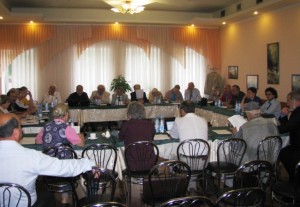
The forum was founded at a working meeting of prominent dissidents and fighters for human rights in the USSR, who had gathered together to remember of the victims of the genocide of the Crimean Tatars (the May 18, 1944 deportation), the Crimean Tatars’ Mejlis reported.
The meeting participants adopted a statement on the foundation of the Crimean Forum, stating that cardinal changes have occurred in the political and economic life of independent states since the collapse of the world Communist system over 20 years ago.
“However, no matter how different these changes may be, the situation with civil rights and freedoms in some former Communist states deserves close attention and often needs an immediate reaction from international institutions and human rights organizations. In countries such as the republics of Central Asia, Armenia, Belarus, Russia, and Ukraine, democratic processes are being stopped rapidly and political opposition and civil activists are being persecuted,” the statement says.
“Wishing to ensure the continuity of the human rights movement of the former USSR in the work of civil society institutions in the former Soviet states, we announce the foundation of the Crimean Forum, an annual meeting of political prisoners of the Communist regime and human rights activists in Crimea,” the statement says.
The meeting participants has tasked a working group with developing and discussing with all political prisoners of the Communist regime and human rights activists who share the idea of the foundation of the Crimean Forum organizational documents determining the composition of the forum, the procedures and time of its conviction, the formation of the agenda, and the decision-making process by September 1, 2012.
source Interfax-Ukraine
–Т —А–∞–±–Њ—В–µ —Б–Њ–≤–µ—Й–∞–љ–Є—П —Г—З–∞—Б—В–≤–Њ–≤–∞–ї–Є –Р–Ы–Х–Ъ–°–Х–Х–Т–Р –Ы—О–і–Љ–Є–ї–∞ (–†–Њ—Б—Б–Є—П, –Ь–Њ—Б–Ї–≤–∞), –Р–†–£–Ґ–£–Э–ѓ–Э –Т–∞—А–і–∞–љ (–Р—А–Љ–µ–љ–Є—П, –Х—А–µ–≤–∞–љ), –С–£–Ъ–Ю–Т–°–Ъ–Ш–Щ –Т–ї–∞–і–Є–Љ–Є—А (–Т–µ–ї–Є–Ї–Њ–±—А–Є—В–∞–љ–Є—П, –Ъ–µ–Љ–±—А–Є–і–ґ), –У–Ю–†–С–Р–Э–Х–Т–°–Ъ–Р–ѓ –Э–∞—В–∞–ї—М—П (–§—А–∞–љ—Ж–Є—П,¬† –Я–∞—А–Є–ґ), –У–†–Ш–У–Ю–†–Х–Э–Ъ–Ю –Р–љ–і—А–µ–є (–°–®–Р, –Э—М—О-–Щ–Њ—А–Ї), –Ф–Ц–Х–Ь–Ш–Ы–Х–Т –Ь—Г—Б—В–∞—Д–∞ (–£–Ї—А–∞–Є–љ–∞, –С–∞—Е—З–Є—Б–∞—А–∞–є), –Ч–Ш–°–Х–Ы–ђ–° –Ш–Њ—Б–Є—Д (–£–Ї—А–∞–Є–љ–∞, –Ъ–Є–µ–≤), –Ъ–Р–Ы–Р–С–£–У–Ш–Э –Т–∞–ї–µ—А–Є–є (–≠—Б—В–Њ–љ–Є—П, –Ґ–∞–ї–ї–Є–љ–љ), –Ъ–Ю–Т–Р–Ы–Х–Т –°–µ—А–≥–µ–є (–†–Њ—Б—Б–Є—П, –Ь–Њ—Б–Ї–≤–∞), –Ы–Р–Т–£–Ґ –Р–ї–µ–Ї—Б–∞–љ–і—А (–†–Њ—Б—Б–Є—П, –Ь–Њ—Б–Ї–≤–∞), –Ь–Р–†–Ш–Э–Ю–Т–Ш–І –Ь–Є—А–Њ—Б–ї–∞–≤ (–£–Ї—А–∞–Є–љ–∞, –Ы—М–≤–Њ–≤), –Ю–Т–°–Ш–Х–Э–Ъ–Ю –Т–∞—Б–Є–ї–Є–є (–£–Ї—А–∞–Є–љ–∞, –Ъ–Є–µ–≤), –Я–Ю–Ф–†–Р–С–Ш–Э–Х–Ъ –Р–ї–µ–Ї—Б–∞–љ–і—А (–†–Њ—Б—Б–Є—П, –Ь–Њ—Б–Ї–≤–∞), –†–Х–Ф–Ф–Р–Т–Х–Щ –Я–µ—В–µ—А (–°–®–Р, –Т–∞—И–Є–љ–≥—В–Њ–љ), –°–Т–Х–†–°–Ґ–Ѓ–Ъ –Х–≤–≥–µ–љ–Є–є (–£–Ї—А–∞–Є–љ–∞, –Ъ–Є–µ–≤), –°–Х–Щ–Ґ–Ь–£–†–Р–Ґ–Ю–Т–Р –Р–є—И–µ (–£–Ї—А–∞–Є–љ–∞, –°–Є–Љ—Д–µ—А–Њ–њ–Њ–ї—М), ¬†–°–Ь–Ш–†–Э–Ю–Т –Р–ї–µ–Ї—Б–µ–є (–†–Њ—Б—Б–Є—П, –Ь–Њ—Б–Ї–≤–∞), –•–Р–Ш–†–Ю–Т –Ш–Ј–µ—В (–£–Ї—А–∞–Є–љ–∞, –°–Є–Љ—Д–µ—А–Њ–њ–Њ–ї—М), –•–Ы–Х–С–Ю–Т–Ш–І –Я–µ—В—А (–Я–Њ–ї—М—И–∞, –Ъ—А–∞–Ї–Њ–≤), –®–Х–Т–І–Х–Э–Ъ–Ю –Ю–ї–µ—Б—М (–£–Ї—А–∞–Є–љ–∞, –Ъ–Є–µ–≤), –ѓ–Э–Ъ–Х–Ы–Х–Т–Ш–І –Ґ–∞—В—М—П–љ–∞ (–°–®–Р, –С–Њ—Б—В–Њ–љ).
¬Ђ–Х–≤—А–Њ–њ–µ–є—Б–Ї–Њ-–Р–Ј–Є–∞—В—Б–Ї–Є–є —Б–Њ—О–Ј? –Ґ–Њ–ї—М–Ї–Њ —Н—В–Њ–≥–Њ –µ—Й–µ –љ–∞–Љ –љ–µ¬†—Е–≤–∞—В–∞–ї–Њ!¬ї –Ґ–∞–Ї–Њ–є, –Ї–∞–Ї –Љ–љ–µ –Ї–∞–ґ–µ—В—Б—П, –і–Њ–ї–ґ–љ–∞ –±—Л–ї–∞¬†–±—Л –±—Л—В—М –њ–µ—А–≤–∞—П –µ—Б—В–µ—Б—В–≤–µ–љ–љ–∞—П —А–µ–∞–Ї—Ж–Є—П –і—Г–Љ–∞—О—Й–µ–≥–Њ —А–Њ—Б—Б–Є–є—Б–Ї–Њ–≥–Њ –љ–∞–ї–Њ–≥–Њ–њ–ї–∞—В–µ–ї—М—Й–Є–Ї–∞, –Ї–Њ–≥–і–∞ –љ–µ–і–∞–≤–љ–Њ –Њ–±—К—П–≤–Є–ї–Є –Њ¬†–љ–Њ–≤–Њ–Љ –Є–љ—В–µ–≥—А–∞—Ж–Є–Њ–љ–љ–Њ–Љ –њ—А–Њ–µ–Ї—В–µ –љ–∞¬†–њ—А–Њ—Б—В—А–∞–љ—Б—В–≤–µ –±—Л–≤—И–µ–≥–Њ –°–°–°–†. –Р¬†–Љ–∞–Ї—Б–Є–Љ—Г–Љ —З–µ—А–µ–Ј —Б–µ–Ї—Г–љ–і—Г —П¬†–Њ–ґ–Є–і–∞–ї¬†–±—Л —Г—Б–ї—Л—И–∞—В—М —Г–ґ–µ –Ї–Њ–љ–Ї—А–µ—В–љ—Л–є –≤–Њ–њ—А–Њ—Б: ¬Ђ–Ъ—В–Њ –Ј–∞–њ–ї–∞—В–Є—В –Ј–∞¬†—Н—В–Њ —Г–і–Њ–≤–Њ–ї—М—Б—В–≤–Є–µ?¬ї ¬†…
–Ф–∞–≤–∞–є—В–µ –њ—А–Њ–∞–љ–∞–ї–Є–Ј–Є—А—Г–µ–Љ –≤–µ—А–Њ—П—В–љ—Г—О –і–Є–љ–∞–Љ–Є–Ї—Г –Њ–±—Й–µ—Б—В–≤–µ–љ–љ–Њ–≥–Њ –Є¬†—Н–Ї–Њ–љ–Њ–Љ–Є—З–µ—Б–Ї–Њ–≥–Њ —А–∞–Ј–≤–Є—В–Є—П –≤¬†—Б—В—А–∞–љ–∞—Е¬†вАФ –Њ—Б–љ–Њ–≤–∞—В–µ–ї—П—Е –±—Г–і—Г—Й–µ–≥–Њ –Х–≤—А–Њ–∞–Ј–Є–∞—В—Б–Ї–Њ–≥–Њ —Б–Њ—О–Ј–∞¬†вАФ –†–Њ—Б—Б–Є–Є, –С–µ–ї–∞—А—Г—Б–Є –Є¬†–Ъ–∞–Ј–∞—Е—Б—В–∞–љ–µ. 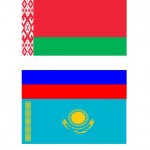
–Т¬†–†–Њ—Б—Б–Є–Є –љ–∞¬†–≤—Л–±–Њ—А–∞—Е –≤—Л–Є–≥—А–∞–ї–∞ ¬Ђ—Б—В–∞–±–Є–ї—М–љ–Њ—Б—В—М¬ї …
–Т¬†–Є–Ј–Њ–ї–Є—А–Њ–≤–∞–љ–љ–Њ–є –С–µ–ї–∞—А—Г—Б–Є –Є–љ–і—Г—Б—В—А–Є–∞–ї—М–љ–∞—П –Њ—В—А–∞—Б–ї—М —Г–ґ–µ –≤—Л—А–∞–±–Њ—В–∞–ї–∞ —Б–≤–Њ–є —А–µ—Б—Г—А—Б …
–Т¬†–Ъ–∞–Ј–∞—Е—Б—В–∞–љ–µ –і–µ–Ї–∞–±—А—М—Б–Ї–Є–µ –±–µ—Б–њ–Њ—А—П–і–Ї–Є –≤¬†–Ц–∞–љ–∞–Њ–Ј–µ–љ–µ —Б—В–∞–ї–Є –Њ—З–µ–љ—М —В—А–µ–≤–Њ–ґ–љ—Л–Љ —Б–Њ—Ж–Є–∞–ї—М–љ—Л–Љ —Б–Є–≥–љ–∞–ї–Њ–Љ…
–Ъ—А–Њ–Љ–µ —В–Њ–≥–Њ, –С–µ–ї–∞—А—Г—Б—М –Є¬†–Ъ–∞–Ј–∞—Е—Б—В–∞–љ –Є–Љ–µ—О—В –Њ–і–љ—Г –Њ–±—Й—Г—О –Є¬†—Б–µ—А—М–µ–Ј–љ—Г—О –њ–Њ–ї–Є—В–Є—З–µ—Б–Ї—Г—О –њ—А–Њ–±–ї–µ–Љ—Г: –љ–Є¬†—Г¬†–Ы—Г–Ї–∞—И–µ–љ–Ї–Њ, –љ–Є¬†—Г¬†–Э–∞–Ј–∞—А–±–∞–µ–≤–∞ –љ–µ—В –њ—А–µ–µ–Љ–љ–Є–Ї–∞…
–Ф—Г–Љ–∞—В—М –Њ¬†—В–Њ–Љ, —З—В–Њ –£–Ї—А–∞–Є–љ–∞ –≤–і—А—Г–≥ –≤–µ—А–љ–µ—В—Б—П –≤¬†–Њ–±—К—П—В–Є—П –Ь–Њ—Б–Ї–≤—Л –≤¬†–Х–Р–°, —Г–ґ–µ –њ—А–Њ—Б—В–Њ –љ–µ—В —Б–Љ—Л—Б–ї–∞вА¶
–Ъ–∞–Ї –±—Л–ї–Њ –Њ–±—К—П–≤–ї–µ–љ–Њ, ¬Ђ–Х–≤—А–Њ–∞–Ј–Є–∞—В—Б–Ї–Є–є —Б–Њ—О–Ј –і–Њ–ї–ґ–µ–љ —Б–ї–µ–і–Њ–≤–∞—В—М –њ–Њ¬†—Б—В–Њ–њ–∞–Љ –Х–°¬ї. –Ґ–Њ¬†–µ—Б—В—М —Б–љ–∞—З–∞–ї–∞ –љ–∞¬†–њ–Њ—Б—В—Б–Њ–≤–µ—В—Б–Ї–Њ–Љ –њ—А–Њ—Б—В—А–∞–љ—Б—В–≤–µ –љ–∞–і–Њ —Б–Њ–Ј–і–∞—В—М –љ–µ—З—В–Њ –њ–Њ—Е–Њ–ґ–µ–µ –љ–∞¬†–Х–≤—А–Њ–њ–µ–є—Б–Ї–Њ–µ —Н–Ї–Њ–љ–Њ–Љ–Є—З–µ—Б–Ї–Њ–µ —Б–Њ–Њ–±—Й–µ—Б—В–≤–Њ…
–Ъ–∞–Ї–∞—П –Љ–Њ—А–∞–ї—М–љ–Њ-—Д–Є–ї–Њ—Б–Њ—Д—Б–Ї–∞—П –±–∞–Ј–∞ –ї–µ–ґ–Є—В –≤¬†–Њ—Б–љ–Њ–≤–µ —Б–Њ–Ј–і–∞—О—Й–µ–≥–Њ—Б—П –Х–≤—А–Њ–∞–Ј–Є–∞—В—Б–Ї–Њ–≥–Њ —Б–Њ—О–Ј–∞? –Ъ–∞–Ї–Є–µ –ї–Є—З–љ–Њ—Б—В–Є –Љ–Њ–≥–ї–Є¬†–±—Л –≥–∞—А–∞–љ—В–Є—А–Њ–≤–∞—В—М –љ–µ–њ—А–Њ—Б—В—Л–µ –Є–љ—В–µ–≥—А–∞—Ж–Є–Њ–љ–љ—Л–µ —И–∞–≥–Є –≤¬†–±—Г–і—Г—Й–µ–µ? …
–Ъ–∞–Ї–Є–µ –љ–Њ–≤—Л–µ –Є–і–µ–Є –Љ–Њ–ґ–љ–Њ —А–µ–∞–ї–Є–Ј–Њ–≤–∞—В—М, –љ–µ¬†—А–Є—Б–Ї—Г—П —Б–Њ–≤–µ—А—И–Є—В—М —Б—В–∞—А—Л–µ —Б–Њ–≤–µ—В—Б–Ї–Є–µ –Њ—И–Є–±–Ї–Є? …¬ї
¬†–°—В–∞—В—М—П – –Ф–ґ—Г–Ј–µ–њ–њ–µ –ФвАЩ–Р–Љ–∞—В–Њ –Ь–Њ—Б–Ї–Њ–≤—Б–Ї–Є–є –Ъ–Њ–Љ—Б–Њ–Љ–Њ–ї–µ—Ж вДЦ 25924 –Њ—В 23 –∞–њ—А–µ–ї—П 2012 –≥. Giuseppe DвАЩAmato Moskovskij Komsomolets.
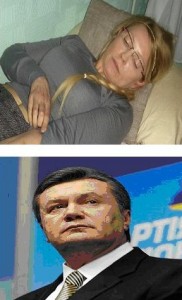 ¬†¬†Gli Europei di calcio in Ucraina sono in pericolo dopo gli attentati di Dnipropetrovsk e lвАЩвАЬaffaireвАЭ Timoshenko. La Germania ha scelto una pausa di riflessione prima di decidere il daffarsi. Ma √® tutta lвАЩUnione europea che guarda preoccupata agli eventi in corso nellвАЩex repubblica sovietica.
¬†¬†Gli Europei di calcio in Ucraina sono in pericolo dopo gli attentati di Dnipropetrovsk e lвАЩвАЬaffaireвАЭ Timoshenko. La Germania ha scelto una pausa di riflessione prima di decidere il daffarsi. Ma √® tutta lвАЩUnione europea che guarda preoccupata agli eventi in corso nellвАЩex repubblica sovietica.
¬†Venerd√ђ 27 aprile ben quattro ordigni hanno seminato il panico a Dnipropetrovsk, provocando il ferimento di 29 persone. LвАЩinterrogativo che si pongono un poвАЩ tutti √® che cosa ci sia dietro quelle bombe: se questa sia lвАЩinizio della strategia della tensione oppure il folle gesto di un delinquente isolato.
¬†La polizia pare brancolare nel buio nonostante la pubblicazione di alcune foto-identikit dei possibili attentatori. I migliori investigatori ucraini studiano ogni particolare in quella che il presidente Viktor Janukovich ha definito вАЬuna sfida per lвАЩintero PaeseвАЭ.
¬†Dnipropetrovsk non √® un luogo qualsiasi. 1,1 milioni di abitanti, distesa sul fiume Dniepr, la citt√† – che ha dato i natali ad importanti politici ucraini tra cui lвАЩex presidente Kuchma e visto in precedenza sorgere la stella di Leonid Breznev in tempi sovietici – √® oggi un feudo dellвАЩex premier Julija Timoshenko, la pasionaria della rivoluzione arancione del 2004, attualmente detenuta in galera dopo una controversa condanna a sette anni per abuso di potere e malversazione.
¬†Subito dopo gli attentati i deputati fedelissimi della Timoshenko, arcinemici del presidente, sono arrivati ad accusare, senza mezzi termini, il presidente ucraino di nascondersi dietro allвАЩazione terroristica. Secondo loro il vero obiettivo di Janukovich sarebbe quello di distrarre lвАЩattenzione dellвАЩopinione pubblica dalla crisi economica e dalle persecuzioni politiche.
¬†Da giorni circolano le foto della Timoshenko piena di lividi. In precedenza, il neo presidente tedesco Gauck aveva cancellato una visita ufficiale a Jalta dopo che Kiev aveva negato il permesso per far curare lвАЩex premier allвАЩestero. In questo clima esplosivo la giustizia ucraina ha deciso di rimandare un ulteriore processo contro la Timoshenko per reati fiscali.
¬†Secondo fonti autorevoli la cancelliera tedesca Angela Merkel potrebbe adesso scegliere la strada del boicottaggio di Euro 2012 se Julija Timoshenko non dovesse essere liberata al pi√є presto. Il presidente del Bayern, Uli Hoeness, ha scritto una lettera al capo dellвАЩUefa, Michel Platini, chiedendo un suo intervento presso Janukovich.
¬†Alcune settimane fa Bruxelles ha congelato la firma del tanto atteso Patto di Associazione tra Ue ed Ucraina fino a che lвАЩвАЬaffaireвАЭ Timoshenko non venga chiarito. LвАЩex premier √® stata condannata in dicembre per aver favorito nel 2009 la firma di un accordo per la fornitura di gas dalla Russia e per aver provocato forti perdite alle casse dello Stato.
¬†Secondo numerosi analisti sullo sfondo di questo scontro Janukovich вАУ Timoshenko cвАЩ√® la vendetta promessa degli oligarchi ucraini contro lвАЩex premier, che in tante occasioni li ha contrastati, facendo loro perdere importanti affari. Berlino e Bruxelles si sono, per√≤, stancati di questa guerra senza fine. EвАЩ arrivato ora il tempo delle decisioni sofferte.
Giuseppe DвАЩAmato
Mr President, thank you for an excellent organization of today’s summit.
The summit allowed us to take stock of the bilateral relations and agree on priorities for the future. It was also an opportunity to assess in more general terms the implementation of commitments and respect to declared values. 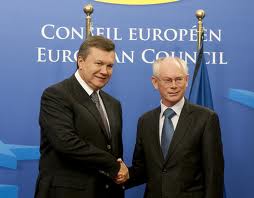
Let me start my reiterating that Ukraine is a partner of strategic importance for the EU. Our commitment to developing the relationship between the EU and Ukraine is firm. Since the last summit there has been developments in the EU-Ukraine relations – both positive and some that have given us reason for strong concern.
Today, we can publically announce that negotiations on the Association Agreement have been finalised. It was difficult work, but your government’s declared European choice and dedication has made it possible to conclude the talks with success. This is a giant step for our relations.
What is encouraging is the broad support this Agreement – and UkraineвАЩs European choice вАУ enjoys in Ukrainian society.
It is also of decisive importance for Ukraine’s progress towards modernisation, prosperity, and the realisation of Ukraine’s European ambition. I pay tribute to the work that has been done.
We want to take steps to sign and ratify the Association Agreement as soon as we can, but this will depend on political circumstances. In this regard, a number of recent domestic developments in Ukraine have led to a difficult atmosphere between the European Union and Ukraine.
The support of European public opinion to Ukraine’s political association and economic integration to the EU is an important asset, closely related to this field. The perceived deterioration of the quality of democracy and rule of law in Ukraine has a direct impact in our Member-States, in our public at large, and in the European Parliament.
Our strong concern is primarily related to the risks of politically-motivated justice in Ukraine. The Timoshenko trial is the most striking example. But just as important, a comprehensive justice
reform in line with international standards is absolutely key. Media freedom and freedom of assembly are also key for a full fledged democracy. Shortcomings have to be corrected.
Mr President, the respect for these principles, enshrined in the Eastern Partnership and at the core of the Association Agreement, is decisive for the pace and depth of rapprochement with the EU and of the signing and ratification of the Association Agreement . But it is also fundamental to Ukraine’s future development as a competitive, dynamic and innovative society.
In this context, the parliamentary elections to be held next year, will be a litmus test. The conduct of these elections will have to meet the commitments of the OSCE, including the ensuring of a level playing field for all possible candidates. And it is of outmost importance that they can exercise their political rights.
¬†We do, however, take note of the cross-party adoption by the Ukrainian Parliament of a new Law on Election of the People’s Deputies. We encourage you to continue close cooperation with the Venice Commission.
In summary, we share not only the common interest but also the common ambition of a closer EU-Ukraine relationship. This summit is proof of our commitment. We will work toward the realisation of this ambition. But this will require a major effort from Ukraine.
Finally, we will have an exchange on a couple of regional issues during lunch.
First on Belarus. Today it is one year since the violations of electoral standards at the 19 December Presidential elections in Belarus, which triggered a crackdown on civil society and political opposition. The developments during the last 12 months are worrying – the atmosphere of repression remains unabated.
The EUвАЩs policy is principled. We stick to our policies of restrictive measures and outreach towards Belarusian civil society and public at large. We will not change this until all political prisoners are released and rehabilitated.
We are happy for the dramatic improvement in Ukraine вАУ Moldova relations since our last Summit. The European Union and Ukraine have a common interest in the territorial integrity of Moldova. We have high hopes for the resumption of the formal talks.
Once again, Mr President, this is an important day in our relations. Hopefully it is the beginning of the important period in which we can fully share common values and common interests.
  The Official statement by President of the European Council Herman Van Rompuy following the 15th European Union-Ukraine Summit.

A Leopoli il costo totale per la preparazione di Euro 2012 √® stato di 13,1 miliardi di grivnija, dei quali 8,6 dal fondo statale. Lo stadio вАЬArena LvivвАЭ ha una capacit√† di 34.915 spettatori.

–Ъ—Г–і–∞ –Є–і–µ—В –£–Ї—А–∞–Є–љ–∞?
19 Oct 2011¬Ђ–†–∞–љ–µ–µ –њ–ї–∞–љ–Є—А–Њ–≤–∞–≤—И–Є–є—Б—П –љ–∞ 19вАУ20 –Њ–Ї—В—П–±—А—П –≤–Є–Ј–Є—В –њ—А–µ–Ј–Є–і–µ–љ—В–∞ –£–Ї—А–∞–Є–љ—Л –≤ –С—А—О—Б—Б–µ–ї—М –љ–µ —Б–Њ—Б—В–Њ–Є—В—Б—П. –Ґ–Њ–љ–∞–ї—М–љ–Њ—Б—В—М –Ј–∞—П–≤–ї–µ–љ–Є–є –Т–Є–Ї—В–Њ—А–∞ –ѓ–љ—Г–Ї–Њ–≤–Є—З–∞ –Є –µ–≥–Њ —Б–Њ—А–∞—В–љ–Є–Ї–Њ–≤ –Њ—В–љ–Њ—Б–Є—В–µ–ї—М–љ–Њ –±–µ—Б–њ–Њ–Ї–Њ—П—Й–µ–≥–Њ –Х–≤—А–Њ–њ—Г –і–µ–ї–∞ –Ґ–Є–Љ–Њ—И–µ–љ–Ї–Њ —В–Њ–ґ–µ —А–∞–Ј–Є—В–µ–ї—М–љ–Њ –Є–Ј–Љ–µ–љ–Є–ї–∞—Б—М. –≠–Ї—Б–њ–µ—А—В—Л –њ—А–µ–і–њ–Њ–ї–∞–≥–∞—О—В, —З—В–Њ –Ї–Њ–Љ–∞–љ–і–∞ —Г–Ї—А–∞–Є–љ—Б–Ї–Њ–є –≤–ї–∞—Б—В–Є –љ–∞ —Е–Њ–і—Г –Љ–µ–љ—П–µ—В –≤–µ–Ї—В–Њ—А –≤–љ–µ—И–љ–µ–є –њ–Њ–ї–Є—В–Є–Ї–Є, –њ–µ—А–µ–Њ—А–Є–µ–љ—В–Є—А—Г—П—Б—М –љ–∞ –Њ–±—К–µ–і–Є–љ–µ–љ–Є—П –≤–Њ –≥–ї–∞–≤–µ —Б –†–Њ—Б—Б–Є–µ–є, –љ–Њ –≤ –Є—В–Њ–≥–µ –Љ–Њ–ґ–µ—В –Њ–Ї–∞–Ј–∞—В—М—Б—П –≤ –љ–Њ–≤–Њ–Љ —В—Г–њ–Є–Ї–µ. ..
–•–Њ—В—П –њ–Њ –Њ—Д–Є—Ж–Є–∞–ї—М–љ–Њ–є –≤–µ—А—Б–Є–Є –≤ –Ф–Њ–љ–µ—Ж–Ї–µ –ѓ–љ—Г–Ї–Њ–≤–Є—З –Є –Ь–µ–і–≤–µ–і–µ–≤ –љ–µ –Ї–∞—Б–∞–ї–Є—Б—М —В–µ–Љ –њ—А–Є–≥–Њ–≤–Њ—А–∞ –Ґ–Є–Љ–Њ—И–µ–љ–Ї–Њ –Є –≥–∞–Ј–Њ–≤—Л—Е –Ї–Њ–љ—В—А–∞–Ї—В–Њ–≤, –љ–Њ –Є—Б—В–Њ—З–љ–Є–Ї ¬Ђ–Э–У¬ї, –±–ї–Є–Ј–Ї–Є–є –Ї –њ–µ—А–µ–≥–Њ–≤–Њ—А–∞–Љ, —Г—В–≤–µ—А–ґ–і–∞–µ—В, —З—В–Њ —Н—В–Є —В–µ–Љ—Л —Б—В–∞–ї–Є –≥–ї–∞–≤–љ—Л–Љ–Є –≤ –љ–µ—Д–Њ—А–Љ–∞–ї—М–љ–Њ–є –±–µ—Б–µ–і–µвА¶
¬†–£–Ї—А–∞–Є–љ–∞ –њ–Њ–Ї–∞ –љ–µ –Њ—В–Ї–∞–Ј–∞–ї–∞—Б—М –Њ—В –µ–≤—А–Њ–Є–љ—В–µ–≥—А–∞—Ж–Є–Є, –љ–Њ —Г–ґ–µ –њ–Њ–≥–ї—П–і—Л–≤–∞–µ—В –≤ –і—А—Г–≥—Г—О —Б—В–Њ—А–Њ–љ—Г: ¬Ђ–° –Њ–і–љ–Њ–є —Б—В–Њ—А–Њ–љ—Л, –љ–∞—И –њ—А–µ–Ј–Є–і–µ–љ—В —А–∞–Ј–і—А–∞–ґ–µ–љ —В–µ–Љ, –Ї–∞–Ї —Б –љ–Є–Љ –Њ–±—Й–∞—О—В—Б—П –≤ –С—А—О—Б—Б–µ–ї–µ вАУ –Ј–∞–±—Л–≤ –Њ –њ–Њ–ї–Є—В–Ї–Њ—А—А–µ–Ї—В–љ–Њ—Б—В–Є, –і–Є–Ї—В—Г—О—В –≥–ї–∞–≤–µ –љ–µ–Ј–∞–≤–Є—Б–Є–Љ–Њ–≥–Њ –≥–Њ—Б—Г–і–∞—А—Б—В–≤–∞ –љ–∞—А—Г—И–µ–љ–Є–µ –Ј–∞–Ї–Њ–љ–Њ–≤ —Н—В–Њ–≥–Њ –≥–Њ—Б—Г–і–∞—А—Б—В–≤–∞, –≤—Л–і–≤–Є–≥–∞—О—В –љ–µ–≤—Л–њ–Њ–ї–љ–Є–Љ—Л–µ —В—А–µ–±–Њ–≤–∞–љ–Є—П. –° –і—А—Г–≥–Њ–є —Б—В–Њ—А–Њ–љ—Л, –≤ –†–Њ—Б—Б–Є–Є, –Њ—В –Ї–Њ—В–Њ—А–Њ–є —Н–Ї–Њ–љ–Њ–Љ–Є—З–µ—Б–Ї–Є –Є –≤ –њ–µ—А–≤—Г—О –Њ—З–µ—А–µ–і—М —Н–љ–µ—А–≥–µ—В–Є—З–µ—Б–Ї–Є –Љ—Л –і–µ–є—Б—В–≤–Є—В–µ–ї—М–љ–Њ —Б–µ—А—М–µ–Ј–љ–Њ –Ј–∞–≤–Є—Б–Є–Љ—Л, —Б–Є—В—Г–∞—Ж–Є—П –Љ–µ–љ—П–µ—В—Б—П: –µ—Б–ї–Є –Ї –≤–ї–∞—Б—В–Є –њ—А–Є–і–µ—В –Т–ї–∞–і–Є–Љ–Є—А –Я—Г—В–Є–љ, –Љ—Л –љ–µ —Б–Љ–Њ–ґ–µ–Љ –њ—А–Є –љ—Л–љ–µ—И–љ–Є—Е —Г—Б–ї–Њ–≤–Є—П—Е —Г–і–µ—А–ґ–∞—В—М —А–∞–≤–љ–Њ–≤–µ—Б–Є–µ. –Х–≤—А–Њ–њ–∞ –љ–∞–Љ –љ–µ –њ–Њ–Љ–Њ–ґ–µ—В, –љ—Г–ґ–љ–Њ —Г–ґ–µ —Б–µ–є—З–∞—Б –љ–∞—Е–Њ–і–Є—В—М —В–Њ—З–Ї–Є —Б–Њ–њ—А–Є–Ї–Њ—Б–љ–Њ–≤–µ–љ–Є—П —Б –†–Њ—Б—Б–Є–µ–є¬ї.
¬†–Я–Њ–ї–Є—В–Њ–ї–Њ–≥ –°–µ—А–≥–µ–є –Ґ–∞—А–∞–љ —Б —Г–і–Є–≤–ї–µ–љ–Є–µ–Љ –≤–Њ—Б–њ—А–Є–љ—П–ї —В–∞–Ї—Г—О –њ–Њ–Ј–Є—Ж–Є—О: ¬Ђ–Х—Б–ї–Є –≤–ї–∞—Б—В—М –Њ–њ–∞—Б–∞–µ—В—Б—П –і–∞–≤–ї–µ–љ–Є—П —Б–Њ —Б—В–Њ—А–Њ–љ—Л –Я—Г—В–Є–љ–∞, —В–Њ –µ–і–Є–љ—Б—В–≤–µ–љ–љ—Л–є —Б–њ–Њ—Б–Њ–± –Є–Ј–±–µ–ґ–∞—В—М —В–∞–Ї–Њ–≥–Њ —Б—Ж–µ–љ–∞—А–Є—П вАУ —Н—В–Њ —Б —Г–і–≤–Њ–µ–љ–љ–Њ–є —Б–Є–ї–Њ–є –Ј–∞–љ—П—В—М—Б—П –µ–≤—А–Њ–Є–љ—В–µ–≥—А–∞—Ж–Є–µ–є. –Я–Њ–ї–Є—В–Є–Ї–∞ –Ј–∞–і–∞–±—А–Є–≤–∞–љ–Є—П –≤ —А–Њ—Б—Б–Є–є—Б–Ї–Њ–Љ –љ–∞–њ—А–∞–≤–ї–µ–љ–Є–Є –≤ –ї—О–±–Њ–Љ —Б–ї—Г—З–∞–µ –љ–µ –њ—А–Є–≤–µ–і–µ—В –љ–Є –Ї —З–µ–Љ—Г —Е–Њ—А–Њ—И–µ–Љ—Г: –Ъ–Є–µ–≤ –њ—А–Њ–і–µ–Љ–Њ–љ—Б—В—А–Є—А–Њ–≤–∞–ї —Б–ї–∞–±–Њ—Б—В—М, –∞ —Б–Њ —Б–ї–∞–±—Л–Љ–Є –њ–∞—А—В–љ–µ—А–∞–Љ–Є –љ–Є–Ї—В–Њ –љ–µ —Б—З–Є—В–∞–µ—В—Б—П, –Є–Љ –і–Є–Ї—В—Г—О—В —Б–≤–Њ—О –≤–Њ–ї—О¬ї. –Я–Њ–ї–Є—В–Њ–ї–Њ–≥ –Р–ї–µ–Ї—Б–µ–є –У–∞—А–∞–љ—М —В–Њ–ґ–µ —Г–і–Є–≤–Є–ї—Б—П: ¬Ђ–Ґ–Њ –ї–Є –ѓ–љ—Г–Ї–Њ–≤–Є—З–∞ –њ–Њ–і—Б—В–∞–≤–ї—П—О—В, —В–Њ –ї–Є –µ–≥–Њ –Є—А—А–∞—Ж–Є–Њ–љ–∞–ї—М–љ–∞—П –ґ–∞–ґ–і–∞ –Љ–µ—Б—В–Є –≤–Ј—П–ї–∞ –≤–µ—А—Е –љ–∞–і –Є–љ—Б—В–Є–љ–Ї—В–Њ–Љ –њ–Њ–ї–Є—В–Є—З–µ—Б–Ї–Њ–≥–Њ —Б–∞–Љ–Њ—Б–Њ—Е—А–∞–љ–µ–љ–Є—П, —Н–ї–µ–Љ–µ–љ—В–∞—А–љ—Л–Љ —А–∞—Ж–Є–Њ–љ–∞–ї—М–љ—Л–Љ —А–∞—Б—З–µ—В–Њ–Љ –Њ—В–љ–Њ—Б–Є—В–µ–ї—М–љ–Њ –µ–≥–Њ –ґ–µ –±—Г–і—Г—Й–µ–≥–Њ. –Ъ–∞–ґ–µ—В—Б—П, –Є —В–Њ –Є –і—А—Г–≥–Њ–µ¬ї. вА¶
¬† –Я—А–µ–і—Б—В–∞–≤–Є—В–µ–ї–Є –Ї–Њ–Љ–∞–љ–і—Л –ѓ–љ—Г–Ї–Њ–≤–Є—З–∞ —Б—В–∞–ї–Є –њ—Г–±–ї–Є—З–љ–Њ —А–∞–Ј–Љ—Л—И–ї—П—В—М –Њ —В–Њ–Љ, —Б—В–Њ–Є—В –ї–Є –Ъ–Є–µ–≤—Г –≤—Л–њ–Њ–ї–љ—П—В—М –≤—Б–µ —В—А–µ–±–Њ–≤–∞–љ–Є—П –Х–°, —З—В–Њ–±—Л –њ–Њ–і–њ–Є—Б–∞—В—М —Б–Њ–≥–ї–∞—И–µ–љ–Є—П, –≤ –Ї–Њ—В–Њ—А—Л—Е –µ–≤—А–Њ–њ–µ–є—Б–Ї–∞—П —Б—В–Њ—А–Њ–љ–∞ –Њ—В–Ї–∞–Ј—Л–≤–∞–µ—В—Б—П —Г–Ї–∞–Ј–∞—В—М –≤–Њ–Ј–Љ–Њ–ґ–љ–Њ—Б—В—М –±—Г–і—Г—Й–µ–≥–Њ –њ–Њ–ї–љ–Њ–њ—А–∞–≤–љ–Њ–≥–Њ —З–ї–µ–љ—Б—В–≤–∞ –£–Ї—А–∞–Є–љ—ЛвА¶ ¬†–Э–µ–Ї–Њ—В–Њ—А—Л–µ —Г–Ї—А–∞–Є–љ—Б–Ї–Є–µ —Н–Ї—Б–њ–µ—А—В—Л –і–Њ–њ—Г—Б–Ї–∞—О—В, —З—В–Њ –њ—А–µ–Ј–Є–і–µ–љ—В—Б–Ї–∞—П –∞–і–Љ–Є–љ–Є—Б—В—А–∞—Ж–Є—П –Ј–∞—В–µ—П–ї–∞ —Б–ї–Њ–ґ–љ—Г—О –Є —А–Є—Б–Ї–Њ–≤–∞–љ–љ—Г—О –Љ–љ–Њ–≥–Њ—Е–Њ–і–Њ–≤—Г—О –Є–≥—А—Г, –њ—Л—В–∞—П—Б—М –≤ –Є—В–Њ–≥–µ –і–Њ–±–Є—В—М—Б—П –Њ—Б–ї–∞–±–ї–µ–љ–Є—П –њ–Њ–ї–Є—В–Є—З–µ—Б–Ї–Њ–≥–Њ –і–∞–≤–ї–µ–љ–Є—П —Б–Њ —Б—В–Њ—А–Њ–љ—Л –Х–° –Є –≥–∞–Ј–Њ–≤–Њ–≥–Њ вАУ —Б–Њ —Б—В–Њ—А–Њ–љ—Л –†–§вА¶.¬ї
–°—В–∞—В—М—П вАУ –Ґ–∞—В—М—П–љ–∞ –Ш–≤–ґ–µ–љ–Ї–Њ – –Э–µ–Ј–∞–≤–Є—Б–Є–Љ–∞—П –≥–∞–Ј–µ—В–∞ 19.10.2011
SUMMARY POINTS  
        (1)    Real sector performance improved in August despite a more challenging external environment.
        (2)    Industrial production growth accelerated to 8.9% yoy, benefiting from stronger domestic demand.
¬†¬†¬†¬†¬†¬†¬† (3)¬†¬†¬† Ukraine may have the second largest harvest this year; however, due to grain export duties and a good harvest in neighboring countries, UkraineвАЩs grain export potential remains untapped.
        (4)    State budget deficit amounted to UAH 8.6 billion, or 0.8% of full-year forecast GDP. However, due to higher Naftogaz imbalances, the broad fiscal deficit is projected to reach 4% of GDP in 2011.
        (5)    The government amended the pension law in September and developed a draft 2012 budget law, targeting a general government sector deficit of 2.5% of GDP. However, the IMF is unlikely  to restore financing without an increase in natural gas tariffs to the population.
        (6)    Thanks to a generous harvest, consumer inflation eased to 8.9% in August but is likely to speed up to about 10-11% yoy at the end of the year.
        (7)    High volatility on international financial markets, worse economic growth prospects and vulnerability of the Ukrainian economy to external shocks caused Hryvnia depreciation pressures to  intensify in August-September.
        (8)    The National Bank of Ukraine is following a tight monetary policy to both reduce inflationary pressures and maintain Hryvnia stability.
        (9)    The current account gap widened to $3.3 billion over January-August, or 2% of full-year GDP, and is projected to reach 4.5% of GDP in 2011.
¬†¬†¬†¬†¬†¬†¬† (10)¬† UkraineвАЩs external debt financing needs remain high. From July 2011 to June 2012, Ukraine has to repay more than $53 billion.
¬†¬†¬†¬†¬†¬†¬† (11)¬† With the current level of international reserves at $38 billion and assuming there is no major external shock, UkraineвАЩs foreign currency needs look manageable. However, as external risks are¬†high, restoration of cooperation with the IMF looks crucial to reduce UkraineвАЩs vulnerabilities
ANALYTICAL REPORT: by Olga Pogarska, Edilberto L. Segura
SigmaBleyzer Private Equity Investment Firm & The Bleyzer Foundation (TBF), Kyiv, Ukraine
U.S.-Ukraine Business Council (USUBC)
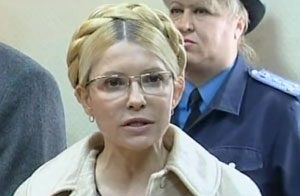 ¬†Colpevole e condannata a sette anni di carcere. Il giudice non aveva ancora finito di leggere la sentenza che Julija Timoshenko gridava gi√† alle televisioni di tutto il mondo la sua rabbia. ¬†LвАЩex primo ministro ucraino √® una donna tutta dвАЩun pezzo. Con lei le mezze misure non valgono: o la si ama o la si odia. Nessun leader politico era mai riuscito a dividere in simil maniera lвАЩUcraina.¬†¬†вАЬAssistiamo ad un nuovo 1937 вАУ ha urlato in tiv√є la Timoshenko, indignata, dopo che, per un paio dвАЩore, aveva sorriso nervosamente ai presenti in aula -. Ucraini, alzatevi e lottiamo insieme contro la dittatura. Porter√≤ il mio caso alla Corte europea dei diritti umaniвАЭ.
¬†Colpevole e condannata a sette anni di carcere. Il giudice non aveva ancora finito di leggere la sentenza che Julija Timoshenko gridava gi√† alle televisioni di tutto il mondo la sua rabbia. ¬†LвАЩex primo ministro ucraino √® una donna tutta dвАЩun pezzo. Con lei le mezze misure non valgono: o la si ama o la si odia. Nessun leader politico era mai riuscito a dividere in simil maniera lвАЩUcraina.¬†¬†вАЬAssistiamo ad un nuovo 1937 вАУ ha urlato in tiv√є la Timoshenko, indignata, dopo che, per un paio dвАЩore, aveva sorriso nervosamente ai presenti in aula -. Ucraini, alzatevi e lottiamo insieme contro la dittatura. Porter√≤ il mio caso alla Corte europea dei diritti umaniвАЭ.
¬†¬†LвАЩex premier √® stata condannata per abuso di potere e malversazione. Nel gennaio 2009, dopo lвАЩennesima guerra del gas con Mosca condita da estenuanti trattative, ha concordato con Putin un contratto che avrebbe procurato allвАЩErario nazionale circa 200 milioni di dollari di danni.¬†
¬†¬†LвАЩesito del processo, secondo numerosi specialisti, era scontato. Gli oligarchi ucraini, a suo tempo, avrebbero promesso di fargliela pagare allвАЩвАЬeroinaвАЭ della rivoluzione вАЬarancioneвАЭ dellвАЩautunno 2004. Troppe volte la Timoshenko, in carica come primo ministro, aveva messo loro i bastoni tra le ruote, facendo perdere importanti affari. Ed il presidente Janukovich, suo acerrimo nemico, √® il paladino di alcuni di questi oligarchi.
¬†¬†Alle notizie provenienti da Kiev, pronte sono state le reazioni negative di Unione europea e Russia. Bruxelles, attraverso un portavoce comunitario, ha messo in chiaro che questo verdetto rischia di compromettere la decisione di concedere allвАЩUcraina lo status di Paese associato allвАЩUe. вАЬNon capisco perch√© le abbiano dato sette anniвАЭ, ha osservato il premier Putin, che ha rimarcato ironicamente che come cifra (sette) non √® male. La Timoshenko, ha ricordato il leader russo вАЬnon √® unвАЩamica, ma un avversario politico, poich√© √® sempre stata orientata verso OccidenteвАЭ.
¬†¬†Adesso vi √® il serio pericolo che ricominci lo scontro tra Kiev e Mosca per il gas con tutte le conseguenze del caso per gli approvvigionamenti europei. LвАЩ80% del metano russo diretto allвАЩUe passa appunto per lвАЩex repubblica sovietica. Il presidente Janukovich ha gi√† reso noto di volere assolutamente ridiscutere il contratto siglato dalla Timoshenko nel 2009.¬†
¬†¬†Sullo sfondo di questa resa dei conti interna vi √® la lotta per la collocazione geopolitica della strategica Ucraina. Putin la vuole a tutti i costi allвАЩinterno della prossima nascente Unione eurasiatica, che dovrebbe controbilanciare ad Est lвАЩUe. Senza Kiev, Mosca lo sa bene, non si pu√≤ ricostruire lвАЩimpero. Di certo non lвАЩUrss, ma un gruppo economico compatto, in grado di competere al tempo della globalizzazione. Il progetto unionista √® centrale nel programma del terzo mandato presidenziale di Vladimir Putin.¬†¬†Janukovich sa perfettamente che gli ucraini non ne vogliono pi√є sapere di Mosca e guardano ad Occidente, ma lвАЩUe si intestardisce a tenere chiuse le sue porte.¬†
¬†Tornando al verdetto di Kiev, lвАЩex presidente Jushenko ha affermato che quello della Timoshenko вАЬnon √® un processo politicoвАЭ. LвАЩex premier non si consult√≤ con lui per la firma dellвАЩaccordo coi russi. Janukovich ha invece tentato di buttare acqua sul fuoco, asserendo che il giudice ha compiuto il suo dovere applicando il vecchio Codice del 1962. LвАЩex premier, che viene chiamata la “Khodorkovskij” ucraina¬†ha, per√≤, la possibilit√† dellвАЩappello.
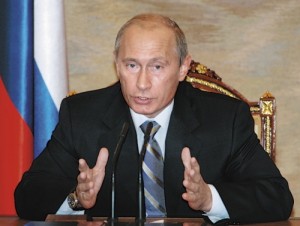 ¬†¬Ђ1 —П–љ–≤–∞—А—П 2012 –≥–Њ–і–∞ –љ–∞—З–Є–љ–∞–µ—В —Б–≤–Њ—О —А–∞–±–Њ—В—Г –Х–і–Є–љ–Њ–µ —Н–Ї–Њ–љ–Њ–Љ–Є—З–µ—Б–Ї–Њ–µ –њ—А–Њ—Б—В—А–∞–љ—Б—В–≤–Њ –†–Њ—Б—Б–Є–Є, –С–µ–ї–Њ—А—Г—Б—Б–Є–Є –Є –Ъ–∞–Ј–∞—Е—Б—В–∞–љ–∞. –Ш –≤ –њ—А–µ–і–і–≤–µ—А–Є–Є —Н—В–Њ–≥–Њ —Б–Њ–±—Л—В–Є—П –Т–ї–∞–і–Є–Љ–Є—А –Я—Г—В–Є–љ –њ–Њ—Б—В–∞–≤–Є–ї —Б–≤–Њ—О –њ–Њ–і–њ–Є—Б—М –њ–Њ–і –њ—А–Њ–≥—А–∞–Љ–Љ–љ–Њ–є —Б—В–∞—В—М–µ–є —Б –Љ–љ–Њ–≥–Њ–Њ–±–µ—Й–∞—О—Й–Є–Љ –љ–∞–Ј–≤–∞–љ–Є–µ–Љ ¬Ђ –Э–Њ–≤—Л–є –Є–љ—В–µ–≥—А–∞—Ж–Є–Њ–љ–љ—Л–є –њ—А–Њ–µ–Ї—В –і–ї—П –Х–≤—А–∞–Ј–Є–Є вАФ –±—Г–і—Г—Й–µ–µ, –Ї–Њ—В–Њ—А–Њ–µ —А–Њ–ґ–і–∞–µ—В—Б—П —Б–µ–≥–Њ–і–љ—П¬ї.
¬†¬Ђ1 —П–љ–≤–∞—А—П 2012 –≥–Њ–і–∞ –љ–∞—З–Є–љ–∞–µ—В —Б–≤–Њ—О —А–∞–±–Њ—В—Г –Х–і–Є–љ–Њ–µ —Н–Ї–Њ–љ–Њ–Љ–Є—З–µ—Б–Ї–Њ–µ –њ—А–Њ—Б—В—А–∞–љ—Б—В–≤–Њ –†–Њ—Б—Б–Є–Є, –С–µ–ї–Њ—А—Г—Б—Б–Є–Є –Є –Ъ–∞–Ј–∞—Е—Б—В–∞–љ–∞. –Ш –≤ –њ—А–µ–і–і–≤–µ—А–Є–Є —Н—В–Њ–≥–Њ —Б–Њ–±—Л—В–Є—П –Т–ї–∞–і–Є–Љ–Є—А –Я—Г—В–Є–љ –њ–Њ—Б—В–∞–≤–Є–ї —Б–≤–Њ—О –њ–Њ–і–њ–Є—Б—М –њ–Њ–і –њ—А–Њ–≥—А–∞–Љ–Љ–љ–Њ–є —Б—В–∞—В—М–µ–є —Б –Љ–љ–Њ–≥–Њ–Њ–±–µ—Й–∞—О—Й–Є–Љ –љ–∞–Ј–≤–∞–љ–Є–µ–Љ ¬Ђ –Э–Њ–≤—Л–є –Є–љ—В–µ–≥—А–∞—Ж–Є–Њ–љ–љ—Л–є –њ—А–Њ–µ–Ї—В –і–ї—П –Х–≤—А–∞–Ј–Є–Є вАФ –±—Г–і—Г—Й–µ–µ, –Ї–Њ—В–Њ—А–Њ–µ —А–Њ–ґ–і–∞–µ—В—Б—П —Б–µ–≥–Њ–і–љ—П¬ї.
¬†–Х—Б–ї–Є –≤–Ї—А–∞—В—Ж–µ, —В–Њ —А–Њ—Б—Б–Є—П–љ–∞–Љ –Њ–±–µ—Й–∞–љ –љ–Њ–≤—Л–є —Б–Њ—О–Ј вАФ –њ—А–∞–≤–і–∞ –љ–µ –°–Њ–≤–µ—В—Б–Ї–Є–є, –∞ –Х–≤—А–∞–Ј–Є–є—Б–Ї–Є–є. –°–Њ—Б—В–∞–≤–Є—В—М –µ–≥–Њ —П–і—А–Њ –і–Њ–ї–ґ–љ—Л –љ—Л–љ–µ—И–љ–Є–µ —З–ї–µ–љ—Л ¬Ђ–Ї–ї—Г–±–∞ –љ–∞ —В—А–Њ–Є—Е¬ї – –Ь–Њ—Б–Ї–≤–∞, –Р—Б—В–∞–љ–∞ –Є –Ь–Є–љ—Б–ЇвА¶.
¬†–Т–љ–µ—И–љ–µ–њ–Њ–ї–Є—В–Є—З–µ—Б–Ї–Є–є –Ї—Г—А—Б –Т–Т–Я –Љ–Њ–ґ–љ–Њ –Є –љ—Г–ґ–љ–Њ –Ј–∞ –Љ–љ–Њ–≥–Њ–µ —А—Г–≥–∞—В—М. –Э–Њ —Г–њ–Њ—А–љ–Њ–µ –њ—Г—В–Є–љ—Б–Ї–Њ–µ —Б—В—А–µ–Љ–ї–µ–љ–Є–µ –≤–љ–Њ–≤—М –Ј–∞–њ—Г—Б—В–Є—В—М –≤ –±—Л–≤—И–µ–Љ –°–°–°–† –Є–љ—В–µ–≥—А–∞—Ж–Є–Њ–љ–љ—Л–µ –њ—А–Њ—Ж–µ—Б—Б—Л вАФ —Н—В–Њ —В–Њ, —З—В–Њ –њ–Њ–ї–љ–Њ—Б—В—М—О –Њ—В–≤–µ—З–∞–µ—В –љ–∞—И–Є–Љ –љ–∞—Ж–Є–Њ–љ–∞–ї—М–љ—Л–Љ –Є–љ—В–µ—А–µ—Б–∞–Љ.
¬†–Ь—Л –ґ–Є–≤–µ–Љ –≤ —Н–њ–Њ—Е—Г –≥—А–∞–љ–і–Є–Њ–Ј–љ—Л—Е –≥–µ–Њ–њ–Њ–ї–Є—В–Є—З–µ—Б–Ї–Є—Е —Б–і–≤–Є–≥–Њ–≤ –≤ –Х–≤—А–∞–Ј–Є–Є. –Т–µ–ї–Є–Ї–Є–є —Б–њ—П—Й–Є–є –Љ–Є—А–Њ–≤–Њ–є –њ–Њ–ї–Є—В–Є–Ї–Є вАФ –Ъ–Є—В–∞–є – –Њ—З–љ—Г–ї—Б—П –Є —Б –Ї–∞–ґ–і—Л–Љ –≥–Њ–і–Њ–Љ –≤—Б–µ –±–Њ–ї–µ–µ —Г–≤–µ—А–µ–љ–љ–Њ –Є–≥—А–∞–µ—В –Љ—Г—Б–Ї—Г–ї–∞–Љ–Є. –Ш—Б–ї–∞–Љ—Б–Ї–Є–є —Д—Г–љ–і–∞–Љ–µ–љ—В–∞–ї–Є–Ј–Љ —Б—В–∞–ї –і–ї—П –љ–∞—З–∞–ї–∞ –•–•I –≤–µ–Ї–∞ —В–µ–Љ, —З–µ–Љ –Ї–Њ–Љ–Љ—Г–љ–Є–Ј–Љ –±—Л–ї –і–ї—П –њ–µ—А–≤–Њ–є –њ–Њ–ї–Њ–≤–Є–љ—Л –≤–µ–Ї–∞ –•–•: –≤–Њ–Є–љ—Б—В–≤–µ–љ–љ–∞—П –Є–і–µ–Њ–
Internal Server Error
The server encountered an internal error or misconfiguration and was unable to complete your request.
Please contact the server administrator, webmaster@europarussia.com and inform them of the time the error occurred, and anything you might have done that may have caused the error.
More information about this error may be available in the server error log.
